ADOLPHE DEMOLIN
Notes:
·
Items in italics are supplementary comments added after Alphonse had written these short notes on his very full life.
My Early Background
·
Children: Jules - born Lille 12.4.1884
Adolphe - born Lille 6.9.1885 died 8.1 .1984
Georges - born Lille 23.5.1888, died 1947
·
Schooling - 1888 to 1891 - Ecole Maternelle
1891 to 1897- Ecole Primaire, up to Certificat d'etudes
from 1897 to 1900, apprentice as clerk to firm of plumbers, central heating, etc.
1900 - accepted after competitive exam for office work at Lille Hospital
1900- 1901- studies at the Lille Conservatoire. I was told that I could learn the
double bass - nothing else. (He was offered free lessons provided he learned the
double bass, but before lessons on double bass he had to do one year of music theory study - Sylvia). A double bass would be lent so that I could study at home.
Classes five times a week after work. I won a Silver Medal at the end of year
competition.(My niece, Andree Fabrikant has got it). I had a contract with the Kursaal Orchestra.
·
1905-1907- I enlisted in the Engineers Regiment in Versailles, as I wanted to present myself for the entrance exam to the Paris Academy of Music, in October
1905- there was only one place and 18 candidates. I got the place.
In the Regiment we were authorized to work (as civilians) outside the hours of army service. This included rehearsals 6 mornings 8 a.m. to 11.30 and concerts in the park every Sunday and a few others in Paris.
·
The classes at the Academy in Paris were for 2 hours, three times a week.
1908 - One of my army friends, Mougeot, was getting married with the sister of one of Madeleine's friends, who was to be bridesmaid. In France the bridesmaids
always have a 'garcon d'honneur' as escort. The friend who was to escort Madeleine was in prison for four days, for not having saluted an officer My friend
asked me to take his place, but I was not interested. However Mougeot was so
upset that I accepted. That is how I was introduced to Madeleine and her mother, Marie Guerard.
·
End of 1908- Military Service over, I returned to Lille and back to my job at the hospital. I also got in the Municipal Orchestra, Conductor Alfred Cortot who was a celebrated pianist.
·
1909- I was corresponding with Madeleine and in the early summer I went to
Versailles with my father, for our engagement and arrangements for the wedding, which was to be on 21 August. 1909.

Early Married Life
I rented a small house in Lambersart, near my parents' house. It was partly furnished and easy for Madeleine to get used to her new life.
Our wedding was on 21 August at St. Louis Cathedral, reception at Hotel Terminus.
All the friends and family from Lille stayed at the hotel. It rained non-stop all day so
the celebrations went on all night. But Madeleine and I went out quietly and no one
knew where we were staying. Unbeknown to Madeleine her bridesmaids, who helped her to dress for the wedding, had knotted her corset strings and I had to cut
them before she could go to bed. The following day the weather was splendid, and
we all went by coach to the country; I can't remember where, but everyone drank, danced and laughed.
The next day we went back to Lille with the friends and relations, everyone having a happy memory of the previous days.
Madeleine quickly adapted to her life in our small house with garden. She was greatly helped by mother who adored Madeleine, as she herself had three boys.
For me, I had normal work during the day at the hospital, and orchestra at the Theatre from 1 October. On 14 July 1910 Georgette was born at 6a.m.
Grandmere Marie (Madeleine's mother) came early in August to see Madeleine and Georgette and went back to Versailles delighted to see that everything was going
well.
In March 1909 the Theatre de Lille which I had left at midnight, caught fire about 1.30 a.m., and only the walls were left. 102 days later a new theatre was constructed and Faust was the first opera presented.
1910 -1911 - nothing special; we led a quiet life. Madeleine even went several times to the concerts with Georgette in her arms. Everything seemed to be going well, but in the winter 1911-12 I noticed that Madeleine was not looking very well. I supposed she was missing her family, all in Versailles, but did not know what to do.
However, at the end of December 1911, the new secretary in charge of the hospital called me to his office and told me: I learn that besides your work here you have a permanent employment at the theatre.” “Yes, that is correct, since 1909, when I came back from military service. As I am married and have one child, and the salary is insufficient, the work at the theater is a necessary complement, and I feel that my evenings are for me to dispense as I desire. Have you anything to reproach me with”. No, but I don't accept that you have two permanent jobs.” “The theatre is only for six months a year. As I cannot accept your decision, I resign and will leave in 30 days”.
Back home, I told the family and wrote to Madeleine's mother, telling her that in a
month's time we would be in Versailles. Soon after we arrived there we found a nice flat in Rue des Reservoirs, very near the Chapel du Chateau de Versailles.
Then I got a job with Grasset, heating, central heating, etc. The typist in the office was Helen Duveluz who in 1913 married Andre Guerard, Madeleine's brother..
I met several musicians from the Regiment and heard the cinema was looking for a double bass player. I got the job and started at once.
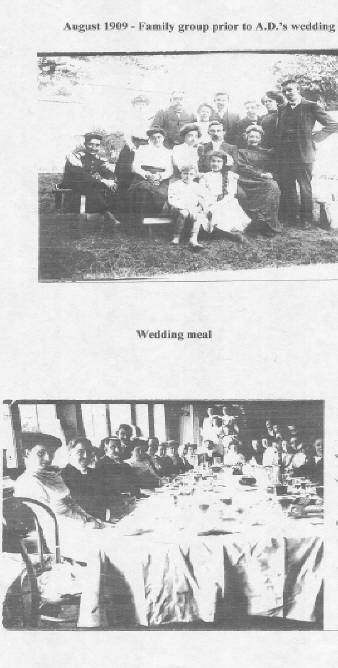
The Great War 1914-18
In July1914 I received my papers to order me to go to Arras for my 28 days of military service. I told my parents, who arranged for Madeleine and Georgette to go and spend the month with them. Of course no one thought of the possibility of war. Then came the invasion of France through Belgium, and the civilians could not move. My Regiment was moved to Angers, taking on all the soldiers who could not rejoin their own Regiments. When we arrived at Pont de Ce, on the Loire, we were more than 2,000 men, who had to be prepared for the battlefield. I was put in charge of the office, with one officer and eight secretaries (males), and worked there until I left for the front in early 1915. I was made Sergeant Major. I was still without any news of Madeleine, Georgette and my parents, who were in the occupied zone, and received supplies through the American Red Cross.
(Note from Minnie Dealy - granddaughter) At some stage during the war Madeleine sent Adolphe a writing pad, pen and a bottle of ink as a reminder that he should write �to me� Must have been early on)
January 1917- very hard winter, temperature minus 18 degrees Celsius. Snow and blizzards. Order to leave for ... We entrain at Reims; 200 men, 120 horses, and all the supplies for the Engineers (carts, pontoons etc.). After three nights and four days, we arrived near St. Quentin. Everyone was frozen. I was ordered to go on horseback with a Corporal, to find lodgings for the men, etc. who would arrive on foot later in the evening. We managed to arrange everything in time. All were ill and tired.
I was suffering from exhaustion, and on 17 January 1917 I was sent to the hospital at Beauvais, in a lorry lying on straw and with one blanket. After 50 km of bad roads I arrived frozen at the hospital. There was no heating, very little water, etc. The doctor examined me for a long time and then we realized we had known each other when I was working at the hospital in Lille. I was two months in hospital, and then was sent to Versailles for convalescence - 3 months, and extension if necessary. I was in such a bad state when I arrived in Versailles that Grandmere Marie called her doctor. I had to have complete rest in bed and a special diet. (mostly milk and macaroni as far as I remember hearing later - Georgette).
Still no news about Madeleine, Georgette and my parents since 12.7.1914. On 16.3.1917 a telegram from the Red Cross in Geneva asked whether we could receive Madeleine and her daughter. Then we were informed they would arrive on 17.5.1917. Both Madeleine and I were surprised to find one another in such poor health, but Georgette was very well. Once again the doctor was called and Madeleine was ordered to take a long rest.
As my health was still very shaky I went to see what could be done to prolong my absence. I was invalided out for one year, and told to come back after that. We went back to our flat which, had been closed since 1914, and I started working with my old firm, but at home. Things got better, except for stomach trouble and pain in my right side. Went to the doctor again, who decided that the best thing would be to have an operation. This was a success and I was back home after 21 days. of convalescence and a strict diet.
In July 1918 I had to go back to the Military Commission. I was taken back in the Army, but not to be sent to the front. I was put in charge of a recruiting office (with 25 women secretaries). As Madeleine was better she decided she would like a light occupation. I asked my Officer whether he wanted an extra secretary, and explained about my wife. When he saw her writing, which was very good, he agreed to have her put on the staff at top salary.
11 November 1918- Signing of the Armistice. In December I asked permission to go to Lille to see my parents. Long, slow train journey of 36 hours. The train stopped before Lille, and I had three hours walk to get there. I found my mother alone, no furniture, hardly any linen, and two camp beds with straw mattresses to sleep on. Complete destitution. My father was in hospital where he had an operation for double hernia, and his health was very bad. (See his photo).My mother looking very old and tired but holding on, told me they could not keep on for long. My father would never be able to work again.
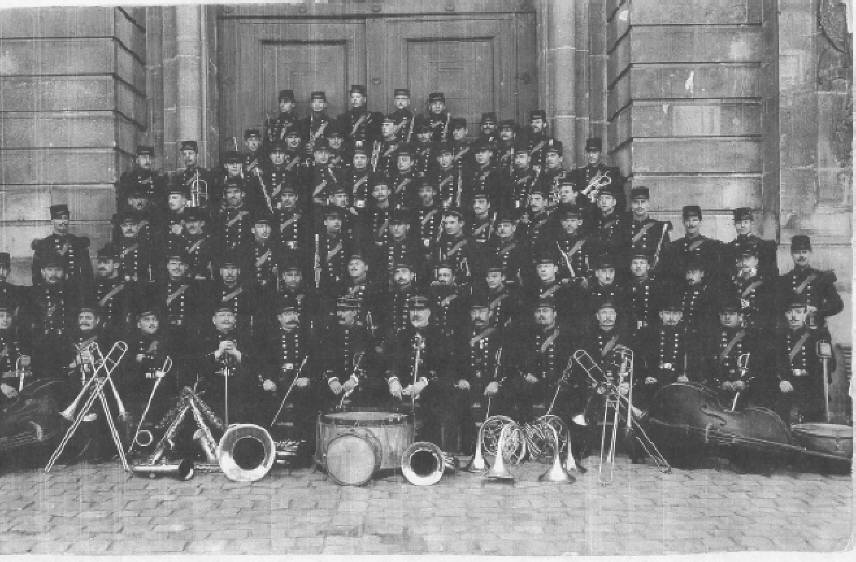
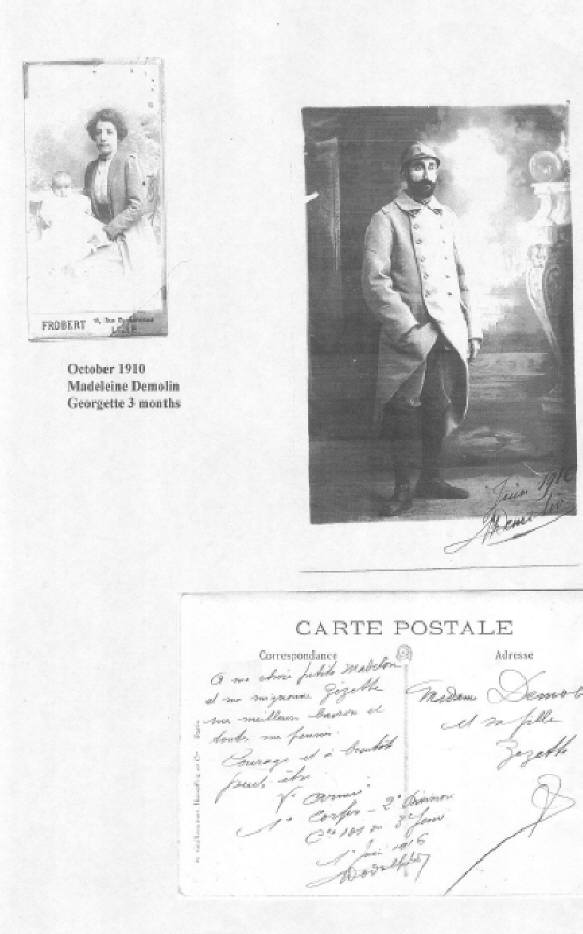
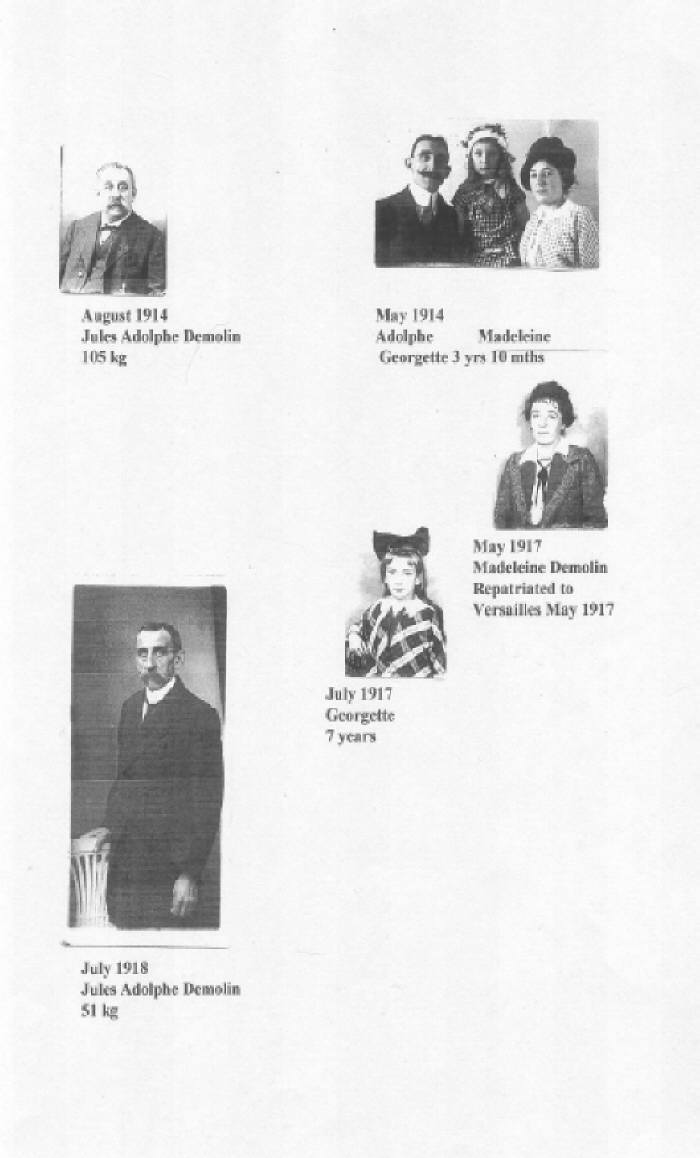
The Years Between the Wars
As my brothers in Lille could not help, we arranged for them to come and live with us in our flat (we were in Paris then) where they came in 1920. We had gone to live in Paris as I was doing a lot more work in orchestras. Then I was offered a three months summer job at Trouville (seaside resort). This was very good for all of us (we took Andree - Georgette's cousin too).
Back in Paris I was employed by the Concerts Pas de loup. We went back to Trouville in 1922 and 1923, then to Deauville until 1926. Unfortunately during a bicycle ride, Georgette had an accident - I tried to catch her and we both fell. She was not badly hurt, but I was taken to the hospital with a very bad displacement of the right shoulder. (It may have been at this stage that Adolphe learned to play the horn - an instrument in which he acquired sufficient skill to have played professionally had he not been able to return to the double bass).
We had to go back to Paris, and it was sixteen months before I could start playing my double bass again. In the meantime I worked as secretary for the Concerts Pasdeloup. This is when I met Piero Coppola of the Gramophone Co. (His Master's Voice - HMV) and as I was able to help him, he offered me a job.
I accepted with pleasure to be Coppola's assistant (good salary and interesting work). The offices were in a very old building, but in 1929 we moved to a new office block in Boulevard Haussmann.
Recording engineers always came to Paris from Hayes in London. In 1929 they were Fowler, married with a charming girl, and George Deakin speaking fairly good French but wanting to improve. He asked Annette (Coppola's secretary) if she knew anyone who could help, and she suggested Georgette, my daughter. They
went out for several months, and before going on leave to England, George asked Georgette if she would marry him.
She was invited to go to visit the family at Clayton, near Newcastle under Lyme, Staffordshire. Then George had to go to Italy for the firm. He was to come back to Paris at Christmas for their official engagement.
Unfortunately he left Milan without his passport and was detained at the frontier until, having got in touch with Fowler; the passport arrived in charge of the guard on
the next train. Of course Georgette had gone to the Gare de Lyon station to meet
the train at 6 a.m. and came back in tears as George was not there. A telegram
arrived later and finally all was well, and the engagement ring was duly presented at a party at our flat.
It was decided to have the wedding at La Madeleine, near Nonancourt in Normandy, where we had bought a house. The wedding was on 25 July 1931.
Several musicians came to play and sing and as the word had gone around, the church was full. The reception was at the Hotel du Grand Cerf at Nonancourt and
the British visitors enjoyed some good French cuisine and wines.
After that everyone returned to their occupations. The young couple went for their honeymoon to Brittany, then settled in Clichy, Paris.
In 1930 I went with the Orchestre Lamoureux for a tour in North Africa - Morocco, Algeria, Tunisia (then French Territories) - 32 concerts in 30 days.
Early in 1932 the doctor told me that Madeleine ought to leave Paris and live in the country, so I handed my resignation to HMV and moved to La Madeleine.
In 1983, on 18 March, Minnie was born at La Madeleine. George came there by the evening train and forgot that this train had Nonancourt as the first stop after Dreux instead of second as usual, so found himself at Verneuil where he had to wait for the first morning train.
Madame Bouniol, one of the secretaries at HMV had a baby, Lucien, on 18 March 1933. She soon found she could not look after him properly as she was very ill with tuberculosis, and had to go to a sanatorium. We decided to take Lucien and look after him, and everyone was very happy.
In 1938 when Sylvia was expected, Madeleine went to stay for a few months in
Stroud, but as Sylvia was not coming, I went to fetch Madeleine and we returned to
Nonancourt before the birth, 6 September 1938
Unfortunately on 1 October 1936 while Suzanne (Madeleine's sister) was with us for a holiday, Madeleine had a severe stroke from which she never recovered completely You know the rest, second stroke in 1943, a further stroke the same year when she became bedridden. Grand mere aged 89 died suddenly on 1 March
1949.
I forgot to talk about the evacuation at the beginning of the war. We were hoping to arrive in time at Cherbourg to sail with the car, and to get to George and Georgette
in England. The German invasion came too fast and we went back to La Madeleine to find everything intact after an absence of two months
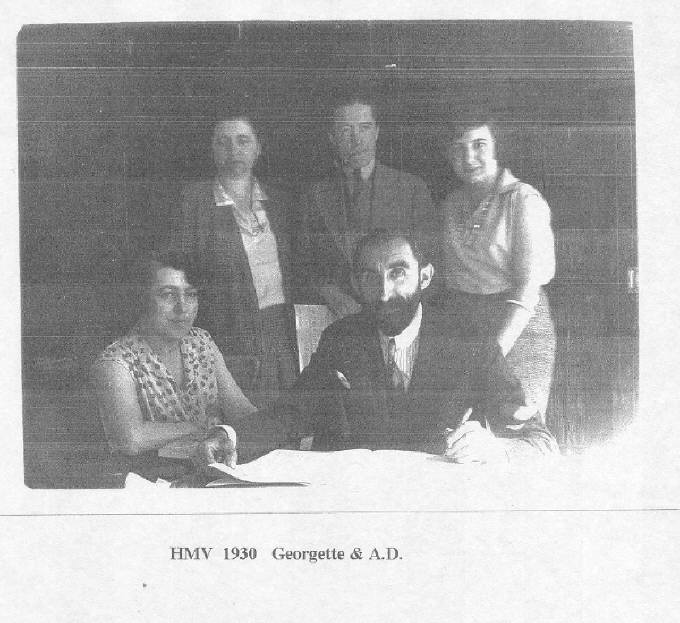
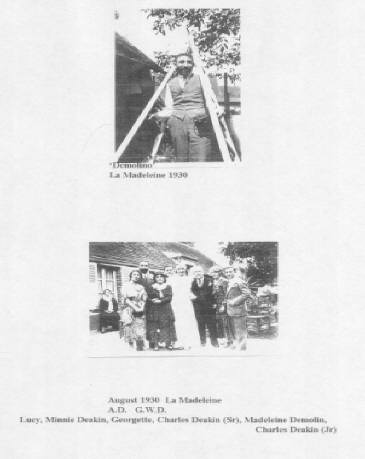
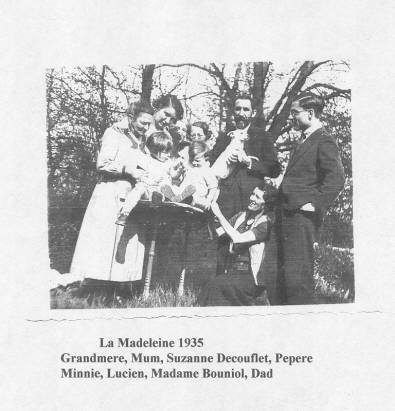
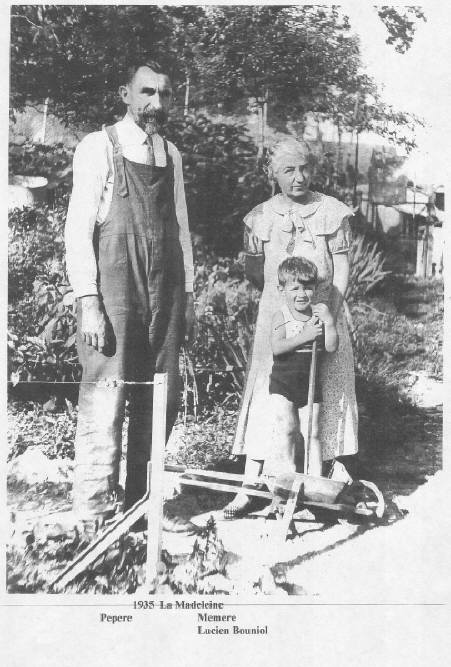
Twilight Years in England
In July 1949 Madeleine and I moved to England to join George & Georgette at Christs Hospital, the other alternative being to enter a rest home in France as Madeleine needed full care, being bedridden. Madeleine died on 11 December 1949 after another stroke on 26 November when I was to have played the “Elephant” by Saint Saens at a school concert.
After Madeleine’s death I was unwell but once better I started hours of work on my double bass. Then I went to London to play with the Modern Symphony Orchestra, conductor Arthur Dennington, until 1960.
In May 1957 George was accepted for a job in Sarawak to start early in 1958 and Georgette asked me what I would like to do as I could not go with them. I did not want to go back to France, having no accommodation and decided to see whether I could stay in England. Miss Taylor whom I had got to know in the Horsham Orchestra offered to let me have two rooms over her flat. I moved my furniture there on I October 1957 and settled there. Minnie was engaged to Martin and they decided to get married earlier than they had planned as the Deakins were leaving and Minnie would have to find new accommodation anyway. The wedding was at the end of December and the wedding breakfast (cum Christmas Dinner) was at the Christs Hospital Tuck Shop.
For me all was well with Margaret, and in 1960 (leap year) she asked me to marry her. I was rather surprised and hesitant, but she insisted so much that I said ‘yes’ as long as I did not have to see to the arrangements. Wedding on 21 March 1960 at Horsham Parish Church, reception at Wakefields Restaurant. We continued to live at 2 Hurst Road. In 1969 the Horsham Council announced that they had bought No 2 and a few other houses to be demolished for road work, and we were offered a small bungalow at Eyles Close which we liked very much as it was much more modern and comfortable.
In July 1972 I went to New Zealand, where Geogette, Minnie and Sylvia were living with their families, and returned to England in November the same year. (At the age of 87 he trenched and dug my clay vegetable patch - Minnie)
Unfortunately in May 1975 I had a stroke in the night and was taken to the hospital where I stayed for six weeks. The doctor wanted me to go to a convalescence centre but I did not want to and returned to Eyles Close.
After three months of trouble with Margaret who could not help me I moved to the French Convalescent home in Brighton on 6 October 1975 where I shall stay for the rest of my life.
Margaret left alone at Eyles Close was taken ill and admitted to Brookfield, a geriatric home in Horsham, 15 April 1976. All the furniture was sold and I was advised afterwards.
All this is very sad. It is the past. In December 1977 Margaret, who had been staying with me at the F.C.H. was hospitalized at St. Francis, Haywards Heath after a nervous breakdown. In July 1978, being better she was sent to the Brighton Hospital but died suddenly during the night of 26 December. Service and cremation 2 January 1979. And there is the story of my long life; I am now in my 94th year, still quite well, otherwise I could not write all this from memory. But alas, really lonely. New Zealand and my family are too far away.
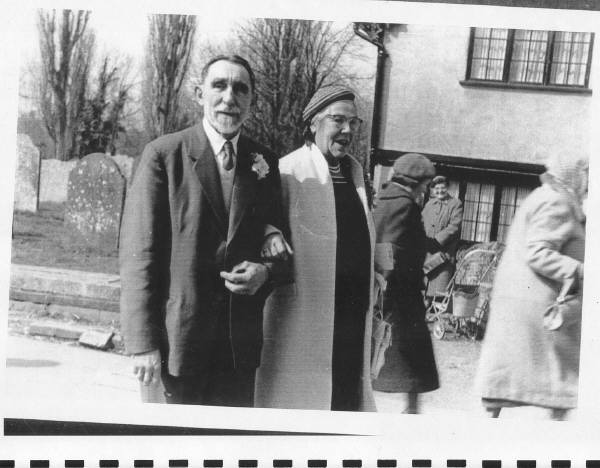
21 March 1960
Additional notes by Minnie Dealy (Granddaughter) 1997
Why no mention of Pepere (Adolphe) having been mayor of his Normandy village, La Madeleine, throughout the war years?
Also his turning a blind eye to issuing of extra ration cards to help feed Allied servicemen who were on the escape route back to U.K.
There was also the time the Germans told him that they were going to requisition all water tankers from the local farms and that he had to advise the farmers. He did.
They sabotaged the tankers by putting manure in - etc. etc. - fertile imaginationl
Then another time the Germans heard that there was a resistance worker hiding in a certain house. Pepere took them to that house and spoke very loudly to the 'deaf'
owner- which alerted the resistance worker, and he escaped from the back of the house to another 'safe' house.
Pepere and Memere had two German officers billeted with them, and they could not have been more pleasant, only wanting to return home to Germany.